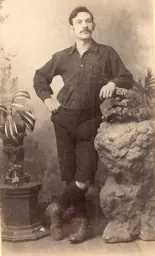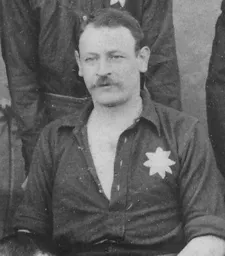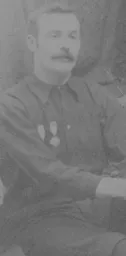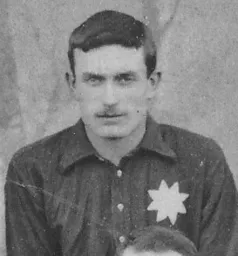The Luton Reporter -
“Luton and the English Cup. The members of the Luton Town team continued their victorious career in the English Cup competition on Saturday by easily beating Bedminster in the third round of the qualifying series, this being the semi-final round for the division. This was the first time that the Lutonians had had to go away from home, the victories over Swindon and Windsor Phoenix having been obtained on the Dunstable-road ground. It was somewhat unfortunate that the club were set such a long journey, for the probabilities of getting a large attendance were not great and the expenses of travelling would consequently fall to a considerable extent on the home executive. It was with light hearts, however, that the members of the team set out on Friday afternoon for what was known of their foemen did not lead to the supposition that much difficulty would be experienced in vanquishing them. The Westerners had been peculiarly fortunate in escaping elimination at an earlier stage. They received a bye in the first round and in the second batch the 93rd Highlanders were compelled by stress of circumstances to scratch to them. They had not thus had an opportunity of exhibiting their prowess. On Saturday week, however, they played an ordinary game with Swindon, who beat them by no fewer than 13 goals to nothing. Although it was stated that four of the best men of the Gloucestershire eleven were then absent, the Lutonians had ample justification for believing that they would win.
Shortly after 6 o’clock on Saturday the platform at the Midland station was crowded by enthusiasts who intended to avail themselves of the facilities afforded by the railway company for visiting Bristol. Tickets were taken by nearly 200 and about half of the number were accommodated in saloons. The morning was dark and uncompromising but football lovers reck not of discomfort, and those of whom were bent upon following the fortunes of their favourites set forth on their 200 mile journey with light hearts. As time wore on the sun broke through, many a delightful glimpse of cloud-capped hill and wooded plain being obtained. At about mid-day the Western city was reached after a capital run, and the travellers were enabled to engage in a tour of inspection, the game not being timed to commence until upwards of two hours later.
At the hour announced for the start there was a somewhat meagre attendance, and it seemed that about half the onlookers hailed from Bedfordshire, photographs of Taylor (the Luton captain), and a gold-stamped ivy leaves bearing the injunction “Play up, Luton,” being noticeable in all directions. After some delay caused by the non-arrival of two of the home eleven, the rival captains tossed for position with the result that Taylor lost. Bedminster elected to play uphill, and ten minutes after time Oclee kicked off for the visitors against a strong wind. It at once became apparent that the ground was very heavy, for not only were slips frequent, but the speed of the forwards seemed to be greatly interfered with. The home forwards started pressing, but the Lutonians retaliated, and Batten relieved once or twice in extremely good style when his opponents looked like doing mischief. When the game had been in progress about three minutes, H. Whitby rushed the ball down the left wing in grand style, and from the centre with which he finished up Deacon scored the first point in the game. Tame play followed for a space, and then Luton pressed, Paul distinguishing himself by the determined fashion in which he tackled his adversaries and deprived them of possession. The Bedminster spectators must have experienced an anxious time about now, for the ball was kept in front of their representatives’ fortress for some minutes. Despite their most strenuous efforts, however, the visitors were unable to improve their total, the home back division acquitting themselves nobly, and preserving their goal downfall in a manner as admirable as it was astonishing. Hoy evoked a shout of laughter hereabouts by kicking the sphere out of bounds into a road close by, a manoeuvre which was twice repeated by Sanders at a later stage. Although they had secured a manifest advantage, the play of the “reds” had not yet come up to what was expected of them; it was almost utterly devoid of brilliancy, and was of a painfully slow character. There had been but little combination amongst the forwards, and although this defect was afterwards remedied somewhat the men did not at any period of the match display the same excellent passing tactics which were exhibited in the Windsor Phoenix encounter. If anything the homesters were worse, for in the early portion of the game they did not make the slightest attempt to combine, their sole idea seemingly to kick the leather as far as they could towards their opponents citadel. Taylor, the popular leader of the Lutonians, had been doing a vast amount of work in the meantime and he frequently evoked the sympathetic plaudits of the onlookers. On one occasion he threw the ball from the touchline into the mouth of the Bedminster goal, and from the melee which followed it was forced behind the line, a “corner” resulting. “Hands” fell to the visitors in the centre of the ground twice in rapid succession, bit no advantage accrued to them. Sanders took the free kick on one occasion and was jeered at by a section of the crowd when he kicked over the bar. Bedminster took their turn at invading the enemy’s territory, but the forwards were stopped by Taylor who transferred to H. Whitby, who brought the ball down the side in good style. The same player next had a tussle with the home backs, whom he evaded, and centred the leather in that admirable manner for which he has lately made himself noted. It was rushed between the posts and a delighted shout burst forth from the Bedfordshire men, but to their chagrin the referee declined to award the point, averring that the ball went through off Paul’s hands. The Luton goal-keeper soon afterwards was forced to use his hands, the opposing forwards swarming to the attack in determined fashion. The pressure was not long sustained, however, H. Whitby transferring the scene of operations to the other end by a brilliant run. He finished up by a magnificent shy at the uprights, but the home keeper acquitted himself worthily and all that was conceded was a “corner” which proved profitless. Oclee, who had been playing in a manner which distinctly favoured of lack of condition, next showed up prominently by sending in a hot shot which was splendidly kept out. The Gloucestershire men imitated the example of their rivals by obtaining a “corner,” the first which they had yet secured. This was not improved upon, and Oclee and Cheshire passed finely together right down the field, the last-named concluding with an attempt which struck the cross-bar. The goal-keeper on the home side made a bad mistake shortly afterwards, but it was fortunately unattended with bad results. He ran out at the ball but missed it and the leather rolled dangerously near to his charge, but the Luton forwards did not avail themselves of the opportunity this presented. H. Whitby and Cheshire carried the ball down their wing immediately afterwards and from the kick into the front of the goal Oclee scored, though with considerable difficulty. Up to this point the weather had been brilliantly fine, but rain now fell heavily for some minutes. This rendered the turf more slippery than it was previously and the ball more difficult to manipulate satisfactorily. Only a short-time had elapsed since the second notch was secured when the Luton left wing men repeated their rushing tactics and the sphere went through off Batten. Oclee was ruled “off-side” directly afterwards, though he had passed the opposing backs, and about now H. Whitby and Paul continually rendered themselves noticeable, the latter “heading” splendidly. F. Whitby had also been doing some capital work on the right wing, while Deacon was as courageous as ever. The first-named made several fine runs, and at about this stage he passed very prettily to the centre, the result being that a “corner” was secured. The interval arrived at a very critical period . The Lutonians had obtained another opportunity of kicking into goal from the corner flag, and when the whistle blew a very exciting struggle was taking place in front of the Bedminster goal. When the teams crossed over the record was as follows: Luton 3 Bedminster 0. The first few minutes’ play after the re-start was uneventful, but Paul at length imported some variety by sending in a shot which puzzled the home custodian. The Bedminster forwards seemed to have improved considerably and after one or two ineffectual attempts at length succeeded in opening their account, the shot being one which was impossible for Burley to keep out. This seemed to put the homesters on their mettle, and in response to encouraging shouts the Lutonians redoubled their efforts to improve their position. The result was that for an appreciable space the quality of the play was incomparably better than that which had preceded it, but even at its best it did not reach a very high standard. The left wing of the “reds” surpassed their previous efforts about now and made a determined raid into the defenders’ quarters, but no score resulted, their backs kicking behind their goal-line. F. Whitby shortly afterwards obtained possession and finished up a grand run by sending in the finest shot of the day. The ball travelled at a terrific rate and it was at first doubtful whether it had passed the goalkeeper, but when it was seen that a point had been conceded a general shout of applause went up. From this time forward the issue was never seriously in doubt. The visitors continued to play an open game and they continued to press so continuously that for the most part the ball was kept in close proximity to the Bedminster fortress. The besiegers experienced very hard luck, too, for despite the fact that they were constantly attacking they failed to increase their lead. Time after time the home goalkeeper was forced to throw or fist the ball out, then the cross-bar or the posts would be struck, and again the leather would be sent spinning over the top. Occasionally the Bedminster forwards broke away and Taylor (of Bedminster) managed to render himself noticeable, but danger did not threaten except on one occasion when Sanders was hooted by the local partisans for kicking over his own goal when severely pressed. The brother Whitby and Deacon played in conspicuously good style during the constant bombardment of the Bedminster goal. When time arrived the Lutonians had qualified for the divisional final by four goals to one. It should be stated that Paul was injured ten minutes from the start. The teams were as follows:- Luton: goal, J. Burley; backs, A. Sanders and J. Hoy; half-backs, H. Paul, A.H. Taylor (captain) and J. Wright; forwards, H.W. Oclee (centre), H. Whitby, W. Cheshire (left), F.K. Whitby and G. Deacon (right). Bedminster: Goal, I.Wright; backs, G.E. Jones and F.J. batten; half-backs, H.A. Marshall, F.W. Gyles (captain) and F. Skeates; forwards, J.F. McCarthy and H.G. Harris (right wing), H.J. Batchelor (centre), C. Rich and W. Taylor (left wing). Linesmen W.A. Deakin (Bedminster) and E.A. Barford (Luton). Referee, J.R. Riddle.”












